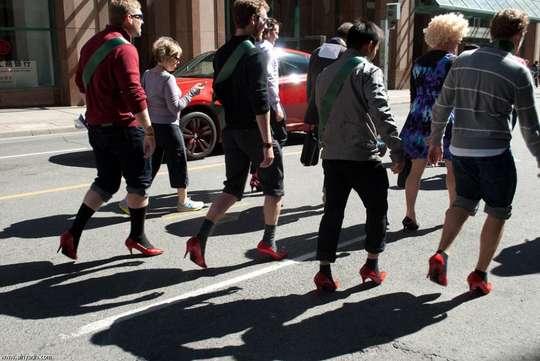Here’s an idea for getting government and business in better touch with the needs of the people they serve: give politicians, business leaders, and other officials the chance to “walk in the shoes” of their customers and constituents.
“Impossible,” you say?
One organization has already done it. Vehicles for Change, a charity serving the disadvantaged in the Washington, D.C. metro area, gave the Chair of the House subcommittee on transportation issues a taste of what it’s like to depend on public transportation for a trip to the grocery store.
The legislator, Congressman James Malone, Jr., said riding the bus was a common activity when he was a student, but he “couldn’t remember the last time he had done so.”
Let’s take a look at the pilot program started by Vehicles for Change (VFC) to see whether it could be a valuable tactic for other businesses – not just nonprofits, but for any organization wanting to do a better job of accomplishing their mission.

(Courtesy of The Flagmakers)
VFC and the Walk in Their Shoes Program
Vehicles for Change is a nonprofit dedicated to helping people without transportation acquire affordable and reliable cars. Their belief is that transportation not only helps with grocery store and medical provider visits, but can be the leverage someone needs to get a better job and begin to escape from poverty.
The Walk in Their Shoes program launched in 2011 as a way to go beyond describing their services by giving government, civic, and business leaders a way to experience first-hand something many of them had never before faced: depending entirely on walking and public transportation to get through the day.
Joining Congressman Malone in the experiment were LiLi Taylor (Baltimore Mayor’s office), Steve Cole (Keiser Permanente), Suzanne Fisher-Huettner (publisher of The Maryland Daily Record), and Ken Harvey, former linebacker for the Washington Redskins professional football team.
After participating in the day’s activities, the group discussed their observations with 90 other leaders at a luncheon in at OneMain Financial in Baltimore.
Why Personal Experience Matters
It’s one thing to see and hear about the plight of others, but quite another to experience that predicament yourself.
On a personal level – something all of us have seen – what if you were to take your children to a street corner and hold up a cardboard sign asking for money… would that make an impression on you and your family? Better yet, what if you had to stay there on the corner until you’d gathered enough donations to buy lunch for your group?
The potential applications for “walking in their shoes” are enormous for nonprofit organizations. Could for-profit companies gain valuable insight too?
With American industry struggling to compete against lower-priced imports, and many companies eyeing a move overseas just to stay in business, this could be a good time to get out from behind the desk and into reality of the world your employers and customers live in every day.
Walk in Their Shoes for Corporations
Roseburg Lumber Company was, for years, one of the largest privately held companies in the United States. The company’s founder, Kenneth “Pappy” Ford was fond of saying, “There’s no elevator to success. You have to take the stairs.”
One of the many stories relating to Ford’s folk-hero status concerns a recent college graduate who applied for employment with Roseburg Lumber. During a tour of the Dillard, Oregon, mill, the human resources manager asked the applicant about the kind of projects and positions that most interested him.
Pointing to a man in overalls using a huge wrench to coax a machine back into working order, the applicant said, “Well I can tell you one job I don’t want to have!”
The covered-in-grease worker he was pointing to was, of course, none other than CEO Pappy Ford.
Pappy Ford went above and beyond in his pursuit of cmpany excellence. Today’s owners are more likely to hire mystery shoppers to check up on field operations than to do it themselves.
Why not extend that program further and send management out to experience what it’s like to work for or purchase from your company? Why not “walk in their shoes?”
Vehicles for Change found the process enlightening.
You could too.
Abel Cane writes for BoomAlive. His special passion is helping companies leverage the knowledge gleaned from customer service. Catch up with Abel on Twitter at @BoomAlive.



